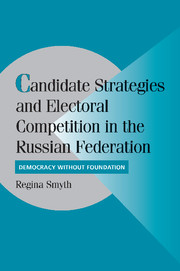 Candidate Strategies and Electoral Competition in the Russian Federation
Candidate Strategies and Electoral Competition in the Russian Federation Book contents
- Frontmatter
- Contents
- 1 ELECTIONS AND THE DEVELOPMENT OF DEMOCRATIC CAPACITY
- 2 ONE STEP FORWARD, TWO STEPS BACK: RUSSIA'S FAILED CONSOLIDATION IN COMPARATIVE CONTEXT
- 3 THE MICROFOUNDATIONS OF DEMOCRATIC RESPONSIVENESS: CANDIDATE STRATEGIES AND ELECTORAL INFRASTRUCTURE
- 4 MANY CANDIDATES, FEW CHOICES
- 5 TO JOIN OR NOT TO JOIN: CANDIDATE AFFILIATION IN TRANSITIONAL RUSSIA
- 6 FINDING FIT: CANDIDATES AND THEIR DISTRICTS
- 7 CAMPAIGNING FOR THE DUMA: MIXED MARKETS, MIXED MESSAGES
- 8 DEMOCRATS, DEMOCRATIC TRANSITIONS, AND RUSSIAN DEMOCRACY
- Appendix A The Sample
- Appendix B The Candidate Survey
- Appendix C Variables Constructed from Survey Data
- Appendix D Sample and Variable Construction for Analysis in Chapter 2
- Works Cited
- Index
- Cambridge Cultural Social Studies
3 - THE MICROFOUNDATIONS OF DEMOCRATIC RESPONSIVENESS: CANDIDATE STRATEGIES AND ELECTORAL INFRASTRUCTURE
Published online by Cambridge University Press: 25 July 2009
- Frontmatter
- Contents
- 1 ELECTIONS AND THE DEVELOPMENT OF DEMOCRATIC CAPACITY
- 2 ONE STEP FORWARD, TWO STEPS BACK: RUSSIA'S FAILED CONSOLIDATION IN COMPARATIVE CONTEXT
- 3 THE MICROFOUNDATIONS OF DEMOCRATIC RESPONSIVENESS: CANDIDATE STRATEGIES AND ELECTORAL INFRASTRUCTURE
- 4 MANY CANDIDATES, FEW CHOICES
- 5 TO JOIN OR NOT TO JOIN: CANDIDATE AFFILIATION IN TRANSITIONAL RUSSIA
- 6 FINDING FIT: CANDIDATES AND THEIR DISTRICTS
- 7 CAMPAIGNING FOR THE DUMA: MIXED MARKETS, MIXED MESSAGES
- 8 DEMOCRATS, DEMOCRATIC TRANSITIONS, AND RUSSIAN DEMOCRACY
- Appendix A The Sample
- Appendix B The Candidate Survey
- Appendix C Variables Constructed from Survey Data
- Appendix D Sample and Variable Construction for Analysis in Chapter 2
- Works Cited
- Index
- Cambridge Cultural Social Studies
Summary
The empirical findings in the previous chapter present a challenge to the current understanding of when competitive elections yield successful democratic consolidation and when they do not. The evidence shows that it is not just national institutions, economics, or attitudes that condition a successful endgame to democratic transitions. Political leaders' participation in electoral competition, and the subsequent molding of opportunities for voter participation, also matter for larger political outcomes. The second finding is that while political parties are often the most important vehicles for prompting elites to work together and invest in strategies that further democratic development, the types of parties that ensure this behavior are not the inevitable outcome of electoral competition, particularly in the early going. In these cases, it is necessary both to look beyond political parties to consider the effects of independent candidates and to scrutinize the internal operation of parties in order to understand the types of parties that contribute to democratic development.
Both of these findings point to the need to study the conditions that lead individual politicians, and in particular candidates and party leaders, to invest in electoral strategies that support the nascent democratic regime. The three components of electoral infrastructure – information, coordination, and cooperation – provide a road map to define democracy-supporting strategies. For example, some political leaders forego electoral competition altogether and seek power through appointment or indirect pressure. Some candidates join political parties, while others do not.
- Type
- Chapter
- Information
- Candidate Strategies and Electoral Competition in the Russian FederationDemocracy without Foundation, pp. 43 - 70Publisher: Cambridge University PressPrint publication year: 2006


